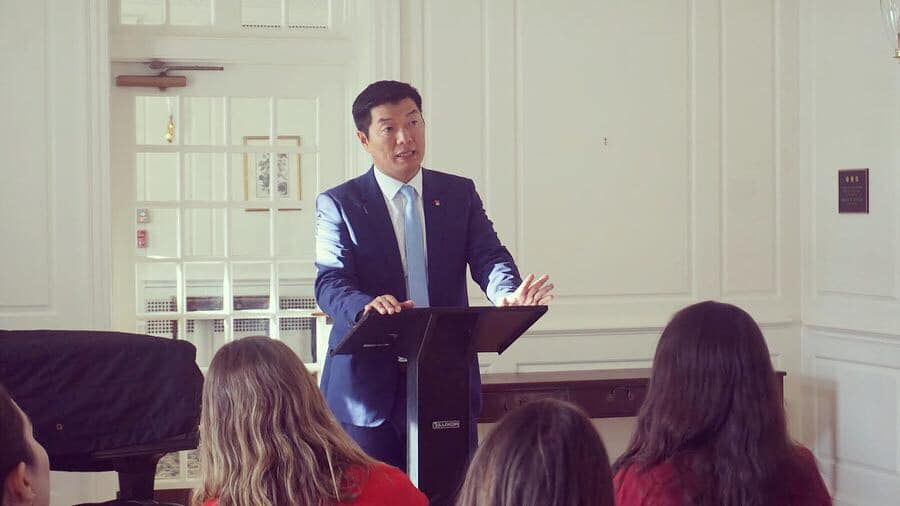What Tibet’s Prime Minister Can Teach Us About Peace

By Marina Yoshimura
“Peace should be the mainstream,” Dr. Lobsang Sangay, Prime Minister of the Central Tibetan Administration said to the student crowd at Pierson College. “It’s Valentine’s Day, and I’m sure you have many appointments, so I thank you for being here,” he added. His talk hosted by the Yale Political Union at Yale College on February 14, 2019, could not have been more timely. Peace is a form of love, one which our generation should reflect on and protect.
Hatred perpetuates violence, setting precedents for years to come. To challenge such precedents, love and peace must replace them. The Central Tibet Administration engages in dialogue with other countries and practicing its pacifist value, which stems from Buddhism, Tibet’s vibrant cultural and historical staple. According to Dr. Sangay, terrorist attacks have increased since 9/11, implying that terrorist attacks are not only contagious but also set precedents for those who vie for international attention. “Tibet fights peacefully, so we get no coverage,” said Dr. Sangay. Violence captures public attention, but with that, ironically, our appreciation for peace may erode as a result of our collective disillusion.
The Chinese government’s approach to Tibet differs from its counterpart’s. The Chinese Hans population rarely invests in Tibet’s laws because there is no quotidian risk given its remoteness, said Dr. Sangay, a statement he had made in 2017 at the Foreign Correspondents’ Club of Japan. But geopolitically and historically, Tibet’s very existence is controversial. Discrimination against Tibetans has ensued for years, prompting an international response. The Human Rights Watch issued a protest against China’s ban against Tibetan students from attending classes. By subjecting children to discrimination, the next generation of Tibetans is at risk of losing opportunities to education. Ostracizing exposes Tibetans to oppression and suppression, which counter the values that Tibet, and supposedly the international community, uphold.
Democracy encourages diplomacy. By engaging in conversations both nationally and abroad, Tibet has been able to sustain a “robust” democracy. Dr. Sangay said he had answered 237 questions in two days in office. (Under the Tibetan government, the Prime Minister must answer all of them. In spite of tensions between Tibet and China and China’s rise,
Dr.Sangay is adamant about practicing diplomacy as a Buddhist endeavor—saying that mindfulness is a form of Buddhism, which has roots in Tibet. For politics, regardless of the fact that the Chinese government works “in parallel” with the Tibetan government. “You have to understand Tibet to understand China,” said Dr. Sangay. Democratic countries would benefit from observing Tibet’s democracy and responding to their cry for support and protection from Chinese oppression. If countries fail to lend a hand to governments of integrity, they, too, may see their democracy wane.
Democracy and peace are both forms of love. Dr. Sangay’s talk was a sign of hope, and a challenge to us to assume the mantle of diplomats and ambassadors of peace. Whether our generation can live up to those expectations depends on us. Valentine’s Day entails more than just chocolates and roses, however sweet—or bitter—they may be. It also encourages us to reflect on humanity and its capacity for peace reminding us that love can prevail.
Marina Yoshimura was a visiting student from Japan. She is the founder and Chief Executive Officer of The Quill Times, a student publication, and is a student at Waseda University in Japan. You can contact her at myoshimura@akane.waseda.jp